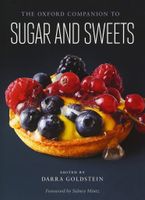Advertisement
Sweetness and Sin
Published 2015
Following the Protestant Reformation in the sixteenth century, sumptuary laws barred excess in sweets as in other luxuries among Catholics and Protestants alike. Changing theologies of divinity and humanity were associated with changing theories of the human body in health and illness, expressed in efforts to separate the “Greek” elements of Galenic theory from its “Arab” elements. Sugar and sweets were redefined as burning, corrosive, and hard to digest. The “burial cakes” (Beerdigungskuchen, usually Blechkuchen, or sheet cakes), “death cakes” (doodkoecks), and avral (or avril) bread or funeral biscuits of German, Dutch, and English Protestants still found in Europe and among their migrant communities in the United States in the nineteenth and early twentieth centuries reflect these changes in theology, medicine, sociality, and food. Like Catholics’ sweets, Protestants’ sweets also speak in the vernacular. The avral breads in nineteenth-century Yorkshire’s North Riding were small, round “crisp sponge” cakes “slightly sprinkled with sugar,” but large round “Scotch short-cakes” in the West Riding. In Leicestershire, Lincolnshire, and Shropshire, they were oblong “sponge biscuits” or “sponge fingers,” but pieces of “rich cake” in Cumbria and “hot plum-cake fresh from the oven” in Radnorshire in Wales.


